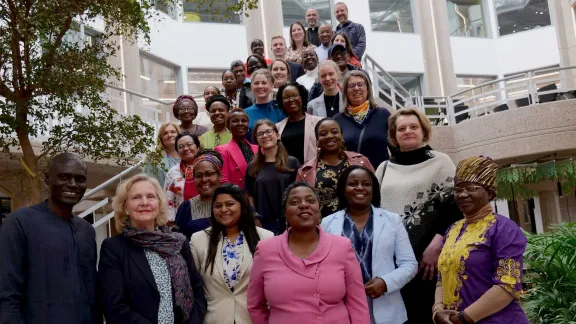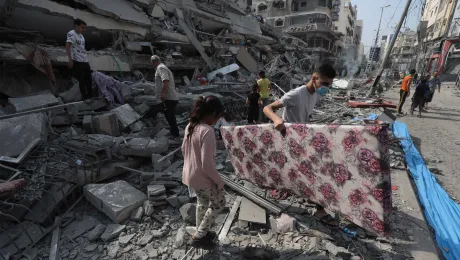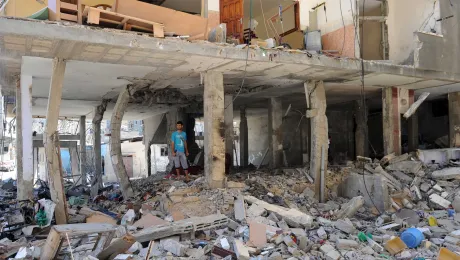
Participants in the Women’s Human Rights Advocacy Training listen to presentations at the opening session. Photo: LWF/C. Kästner
LWF and partners hold Women’s Human Rights Advocacy Training ahead of Beijing Declaration’s 30th anniversary
(LWI) - Gender justice advocates from Africa, Asia, Europe, Latin America and the United States are gathered in Geneva this week for a four-day intensive training designed to link their work at local level to global women’s human rights mechanisms such as the United Nations Convention on the Elimination of Discrimination against Women (CEDAW).
The annual Women’s Human Rights Advocacy Training is organized by the Lutheran World Federation (LWF) in partnership with the World Council of Churches, ACT Alliance, Norwegian Church Aid, Finn Church Aid, Moravian Unity Women’s Desk and World Renew. This year, 21 participants are sharing best practices of empowering women and girls in very different cultural contexts, while learning about ways of strengthening their work to see a greater impact.
Ahead of next year’s 30th anniversary of the Beijing Declaration, which provided a roadmap towards gender equality and committed states to the implementation of a Platform for Action, which highlights 12 critical areas of concern. participants heard from UN researchers and human rights specialists about the vital role of faith leaders in building on progress made over the past three decades. In the face of growing inequalities, increasing wars and conflicts, a deepening climate emergency, shrinking space for civil society and an increasing digital gender gap, speakers noted that there is still much work to be done to combat discrimination and injustice.
This is about practical engagement with CEDAW and other UN mechanisms [but also] about reminding ourselves that what we are doing draws on our theological understanding of our God-given human dignity, ensuring that our advocacy is anchored on the concept of justice as outlined in holy Scriptures.
Sikhonzile Ndlovu, LWF Senior Advocacy Officer for Gender Justice
At the opening session on 15 October, Sikhonzile Ndlovu, LWF’s Senior Advocacy Officer for Gender Justice said, “I am expecting a lot from these participants who are seasoned advocates working for faith-based organizations in different countries. We expect to learn from them and provide them with a platform to share from their different contexts about what works well and where progress is still needed.”
On the one hand, Ndlovu noted, “This is about practical engagement with the CEDAW and other UN mechanisms in order to enhance their capacity for effective action. At the same time, it is about reminding ourselves that what we are doing draws on our theological understanding of our God-given human dignity, ensuring that our advocacy is anchored on the concept of justice as outlined in holy Scriptures.”
Speaking with a collective voice
Rev. Sandra Rosenberga Saavedra, a pastor from the Evangelical Lutheran Church in Chile who is taking part in the training, explained how her church works closely with other non-governmental organizations in her country in order “to speak with a collective voice about these issues.” She noted that, since its foundation, the church has been very active in the defense of human rights for marginalized people, including rural women and, more recently, migrants arriving mostly from Venezuela and Colombia.
Ahead of the training, Rosenberga presented a shadow report to CEDAW detailing research and recommendations from these civil society organizations for improving the lives of women and girls in Chile. The report touches on a wide range of issues including “economic rights, accessing legal frameworks, the reproductive rights of women, challenges connected to human trafficking and the rights of girls in state protection institutions,” she explained. She is hopeful that her government “will pay attention and follow up on our recommendations, I think it has the good will to do this.”
Also attending the training is Adeline Rajkumar, a clinical nutritionist from Chennai in southern India and member of the Tamil Evangelical Lutheran Church. As part of LWF’s Youth network, she attended a recent Peace Messengers workshop in Cambodia to talk about women in peacemaking. “We have a lot of violence and abuse of women in India, as well as a lot of taboos and social norms which say that women can’t take decisions on their own. I hope to learn a lot from participants here about effective advocacy in their different regions and apply that in my country,” she added.


